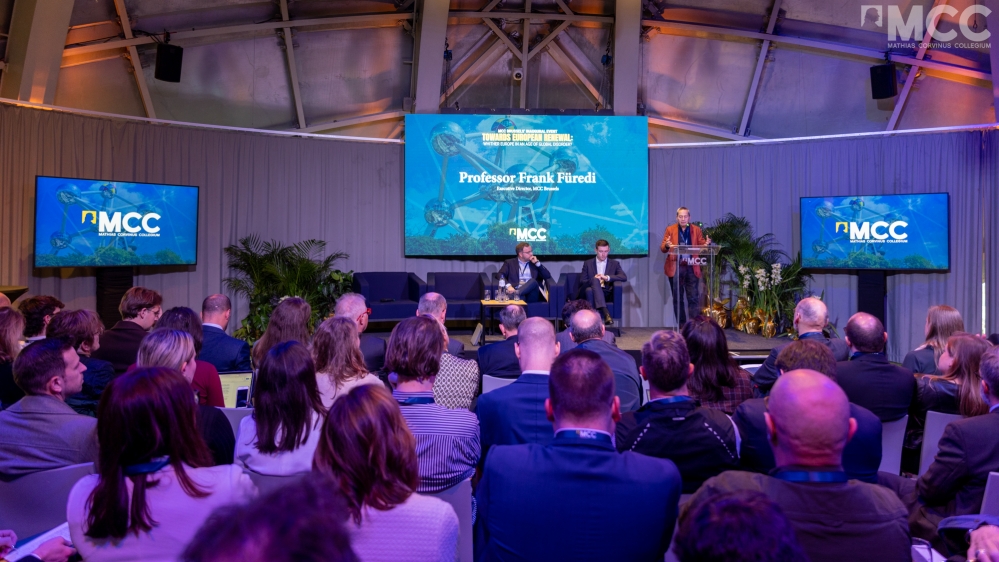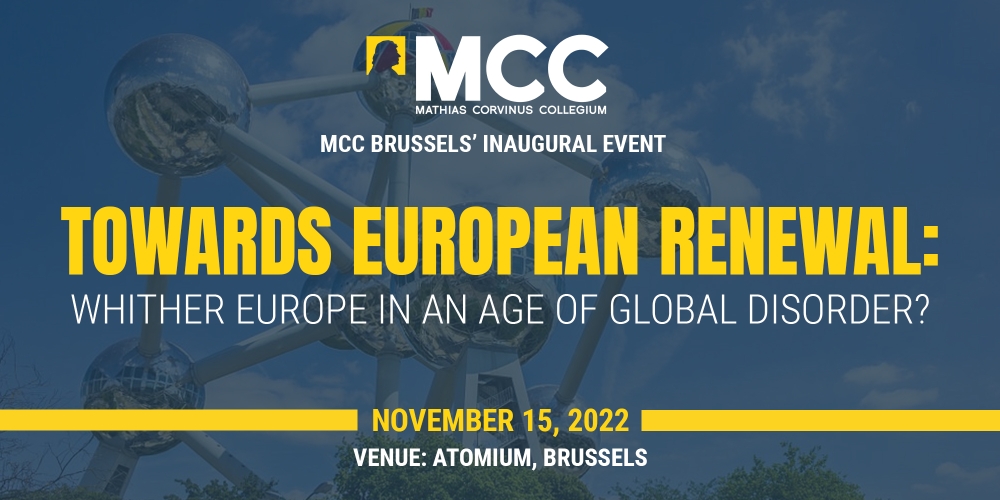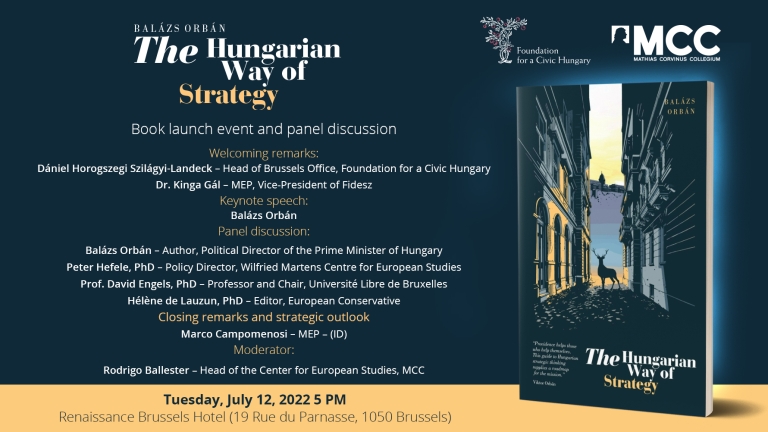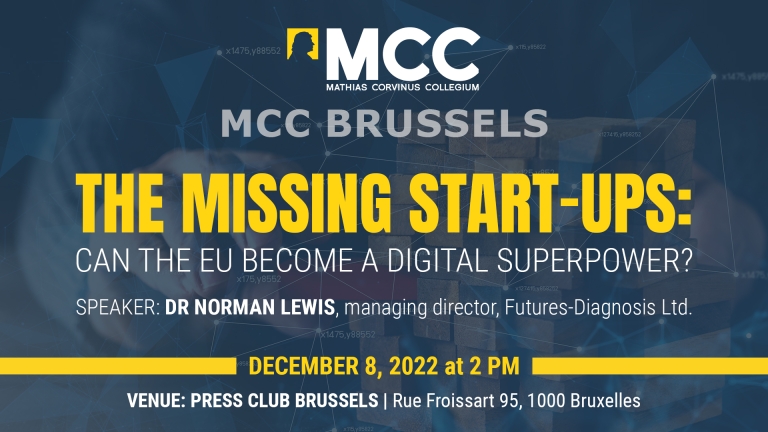13:30 - 18:00, November 15, 2022, Atomium, Brussels
This landmark conference to mark the launch of MCC Brussels will grapple with both these issues head on, inviting academics and thinkers from across the continent for a dialogue about the way forward. Together, we will ask: Is European renewal possible, and what would it require? Whither Europe amid global disorder?
REGISTER HERE
Programme
13.30
Registration and Welcome
14.00 – 14.30
Opening Remarks
- Dr. Balázs Orbán, Chairman of the Board of Trustees, MCC
- Professor Frank Füredi, Executive Director, MCC Brussels
14.30 – 15.15
Keynote Speech: ‘Decolonising Europe: A moral reckoning with colonialism’
- Professor Nigel Biggar, Regius Professor of Moral and Pastoral Theology & Director, McDonald Centre for Theology, Ethics, and Public Life, University of Oxford; author, Colonialism: A Moral Reckoning (forthcoming)
- Moderator: Jacob Reynolds, Head of Policy, MCC Brussels
15.15 – 16.30
Panel I. Global disorder: What’s at stake for Europe?
Few doubt that war in Ukraine has crystallised a new geopolitical map. Yet whilst many praise a renewed degree of Western unity, under the surface it is possible to perceive a trend towards fragmentation. Within the EU, commentators note conflicts between France and Germany, on the one hand, and Eastern European and Baltic states on the other. Well-publicised disputes between the EU and Poland or Hungary also remind us that old tensions have not gone away. Globally, the EU and the USA might be to a degree united on Ukraine, but new conflicts lie in wait over Taiwan and China, not to mention energy, trade, and currency. The emergence of a multi-polar world means that old geopolitical certainties can no longer be the basis for international affairs.
The emergence of multi-polar world coincides with the intensification of economic competition between nations. The harmonious theories of globalisation are challenged by a new, more conflict-oriented geo-political reality and the intensification of economic competition.
This tendency towards disorder is spurred on by the difficulties that major global institutions are experiencing. The institutions that emerged to provide structure to the post-WW2 order – the UN, the IMF, NATO, or the EU – each face their own questions, many of them existential.
What is Europe, and the EU’s, place amid this fracturing world? As Josep Borrell, the EU’s top diplomat, recently noted, Europe is forced to confront a world without the three certainties that defined its recent history: Russian energy, Chinese manufacturing, and American security.
Speakers
- Thomas Fazi, journalist and writer; author, The Battle for Europe: how an elite hijacked a continent - and how we can take it back
- Phil Mullan, writer, lecturer and business manager; author, Beyond Confrontation: globalists, nationalists and their discontents
- Joan Hoey, Europe director and editor, the Democracy Index, Economist Intelligence Unit
- Moderator: Rodrigo Ballester, Head of the Centre for European Studies, MCC
16.30 – 16.45
Coffee break
16.45 – 18.00
Panel II. Culture Wars over Values: Europe at a Crossroads
Across Europe, and indeed the Western world, bitter arguments rage over key political, cultural and historical values. The ‘Culture Wars’, as they are known, seem to pit progressives against traditionalists on a range of social issues, from trans rights to national sovereignty.
Many of the fiercest disagreements are around history. Across the European continent, there are bitter conflicts about the legacy of colonialism, the history of slavery, and about statues to historical political and cultural figures. Even artistic works once regarded as high points of European historical culture, such as those by Mozart or Shakespeare, have become the site of a struggle to ‘decolonise’ European history. These arguments seem to call into question the status and legitimacy of the legacy of European culture altogether.
But can history provide any guidance in an era when the culture wars call into question the status of national myths or achievements? If European culture is the work of slaveholders and colonialists, does it have any legitimacy today to inspire? Is it possible to be critical of elements of history, whilst still retaining the positive achievements of the past? Can Europe’s historical legacy perhaps even be a guide in helping to navigate contemporary disagreement? What is the role of history today, and which values can guide us?
Will Europe find a distinctive role in a multipolar world, or will it be placed under the tutelage of larger powers? Will there even be a singular ‘European’ entity, or will Europe, and the EU, be replaced by smaller, regional alliances, cleaving North/South and East/West? Or will Europe find a solution through further expansion, as suggested by Macron’s new ‘European Political Community’?
What, then, is next for Europe, the EU, and the nations they comprise? Can they navigate a new era of instability, and what awaits us on the other side?
Speakers
- Professor Werner Patzelt, Research Director, MCC Brussels
- Dr. Monika Gabriela Bartoszewicz, Associate Professor, Societal Security and Safety, UiT Arctic University of Norway
- Professor Bill Durodié, chair of international relations, University of Bath; visiting professor, MCC Brussels
- Moderator: John O’Brien, Head of Communications, MCC Brussels
18.00 –
Standing reception



